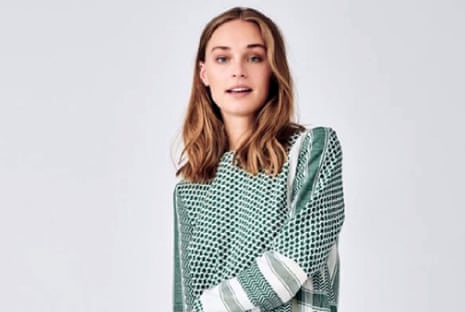The chequered print often seen on the traditional Arab keffiyeh headdress is currently being deployed by luxury brands such as Cecilie Copenhagen, where the print features heavily as part of its autumn/winter collection, as well as fast fashion retailers Boohoo and Asos.
There are concerns that its connections with the Palestinian struggle are being diluted and exploited. Omar Joseph Nasser-Khoury, a Palestinian fashion designer, says the keffiyeh symbolises “dispossession, systematic displacement, extrajudicial killings [and] oppression”. Its use by designers divorced from that context is, he says, irresponsible. “It’s almost disrespectful and it’s exploitative.”
The apparent proliferation of keffiyeh-inspired designs comes at a time of increased debate about cultural appropriation. Practices such as wearing Native American-style headdresses at festivals have been re-examined, and Kim Kardashian’s line of shapewear recently had its name, Kimono, retracted after widespread criticism and an online campaign. Yet Boohoo’s £10 keffiyeh-reminiscent “tribal print smock” doesn’t seem to have met such open criticism.
While some designs riffing on the keffiyeh have encountered enough mainstream protest to be withdrawn, such as a Topshop “festival-ready scarf” playsuit in 2017 and an Urban Outfitters “anti-war woven scarf” in 2007, many others have found their way on to lists of the best dresses in recent summers, as well as being worn by Instagram influencers such as Lucy Williams and Camille Charrière. The Israeli brand Dodo Bar Or’s first collection, which took the print and put it on playsuits and blouses, has been a favourite on Instagram since it was released in 2016. It’s a pattern that has lent itself to the prairie-style dresses that have made the last few seasons’ catwalks feel like the frontier.
At Cecilie Copenhagen, keffiyeh-inspired garments range from €90 (£84) to €240; at Dodo Bar Or dresses can go for more than £1,000.
According to Nasser-Khoury, “it’s almost become commonplace” to see the design co-opted. The effect of this for Amani Hassan, programme director at The Arab British Centre, is “it loses its original meaning” and, with that, “it normalises the occupation”.
It’s current co-option coincides with difficult times in the Palestinian struggle – from the US embassy moving to Jerusalem to the persistent humanitarian crisis in Gaza and the approval of thousands more illegal Israeli settlements in the occupied West Bank.
Although the print is not exclusive to Palestine – different colours are associated with different regions – it is internationally most associated with the Palestinian quest for self-determination. It has long been worn by those wishing to express solidarity, and has been the accessories equivalent of a Che Guevara poster for teenagers wanting to signal a rebellious streak. But now the keffiyeh print seems to have gone from being “activist chic” to straight-up chic.
For Nasser-Khoury there is a specific dynamic at play with the use by an Israeli designer such as Dorit Bar Or. Hassan agrees: “It shouldn’t be [any different] but for the obvious circumstances we are living in right now – that is the sad reality.”
It is not, Nasser-Khoury argues, a “random design … there is a context, there is a power imbalance … there is [a] privilege … you have people who were dispossessed in 1948 and made refugees and they still live in camps in Lebanon and then you use this garment, which carries all that pain, for personal advancement.” Dodo Bar Or declined to comment.
